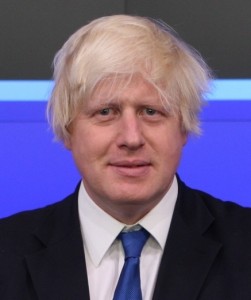
Mayor Johnson got lost in the Golden Ghettos of his city.
LONDON. The loose cannon has fired again: at the Margaret Thatcher Lecture on Wednesday night London mayor Boris Johnson established a rather bizarre connection between IQ and IG - income gap. “16 % of our species have an IQ below 85. Only 2 % above 130”, he said. “The harder you shake the pack, the easier it will be for some to get to the top of the pack.” And he continued: “The income gap between the top cornflakes and the bottom cornflakes is getting wider than ever.” And the mayor of the Golden Ghettos of London was quick to add: “Some measure of inequality is essential for the spirit of envy and keeping up.”
So greed is good. Really? If you watch the mayor’s speech (http://www.youtube.com/watch?v=21TvPHKlyVM) you might start wondering if he got his first class education at the elite boy’s school Eton and later at Oxford because of, or despite his own IQ. We have noted before that the former journalist admires rich people tremendously. After all, it was Johnson who jumped on Lakshmi Mittal in a cloakroom in Davos and extracted £16 million of steel from the steel tycoon to build a 114.5-metre high sculpture in the Olympic Park in East London last year. For monster projects like the Olympic Games, rich donors certainly have their merits. “Thatcher noted”, Johnson reminded his listeners gleefully, “that the good Samaritan would have been useless if he had not been rich enough to help.”
David Cameron must have loved this speech. A few more of these and he does not have to worry about Boris challenging him for the Tory party leadership any more. The mayor is killing himself off politically. Others showered him with criticism. Beside the fact that Johnson shows “unpleasant elitism” as Deputy Prime Minister and LibDem leader Nick Clegg commented, should a mayor be nothing more than a facilitator of donations?
Should we release states and cities from their duty to provide healthcare, education and social security to their citizens and just hope that wealth trickles down voluntarily from the few rich to the many poor? Well, Mr Mayor, it does not work like that in your country or in your city. From April to September 2013, the number of British citizens who use food banks has tripled from 113,264 to 355,985. Thirteen of Britain’s 63 million citizens live under the poverty line. Two million of those are in London. One in four Londoners between the ages of 16 and 24 is unemployed. In London, inequality is greater than in the rest of the island.
This will lead to greater social tension, which will affect in the end the entire nation, not only the poor. The streets of London are becoming ever more dangerous as people get poorer. The housing bubble might burst if ordinary taxpayers cannot afford housing in London. And will rich foreigners then take responsibility for this? Is not the local elected political class to blame?
What does the mayor do to fight the growing poverty gap? In one of his pet projects, the redevelopment of the Battersea power station in southwest London, he promised to market the flats first to locals. He probably never planned housing for socially challenged Londoners there. But even wealthier Brits were shocked to hear this week that the penthouses will go on the market with a price tag of £30 million each. I am personally not sure if any Arab Gulf prince wants to live in a converted power station instead of a townhouse overlooking Hyde Park – but there are certainly not many locals who can afford these prices.
The top one percent of earners contribute 30 percent of income tax, Boris said later in his Thatcher lecture: “this pays for a lot of streets and school. So why, I ask innocently, are they so despicable in the eyes of all decent British people?” Maybe there would be less inequality in Great Britain, if income – and therefore taxpaying – were distributed more equally? But this might be a bit too much to understand for a cornflake who was clearly tossed a bit too high in the box.


